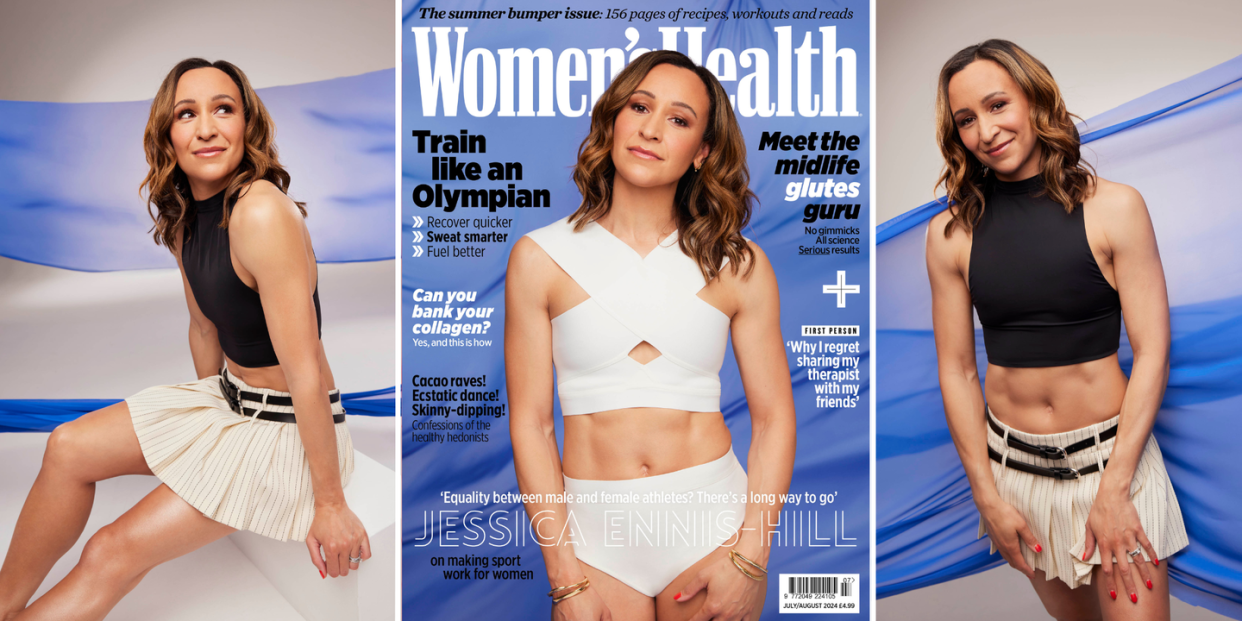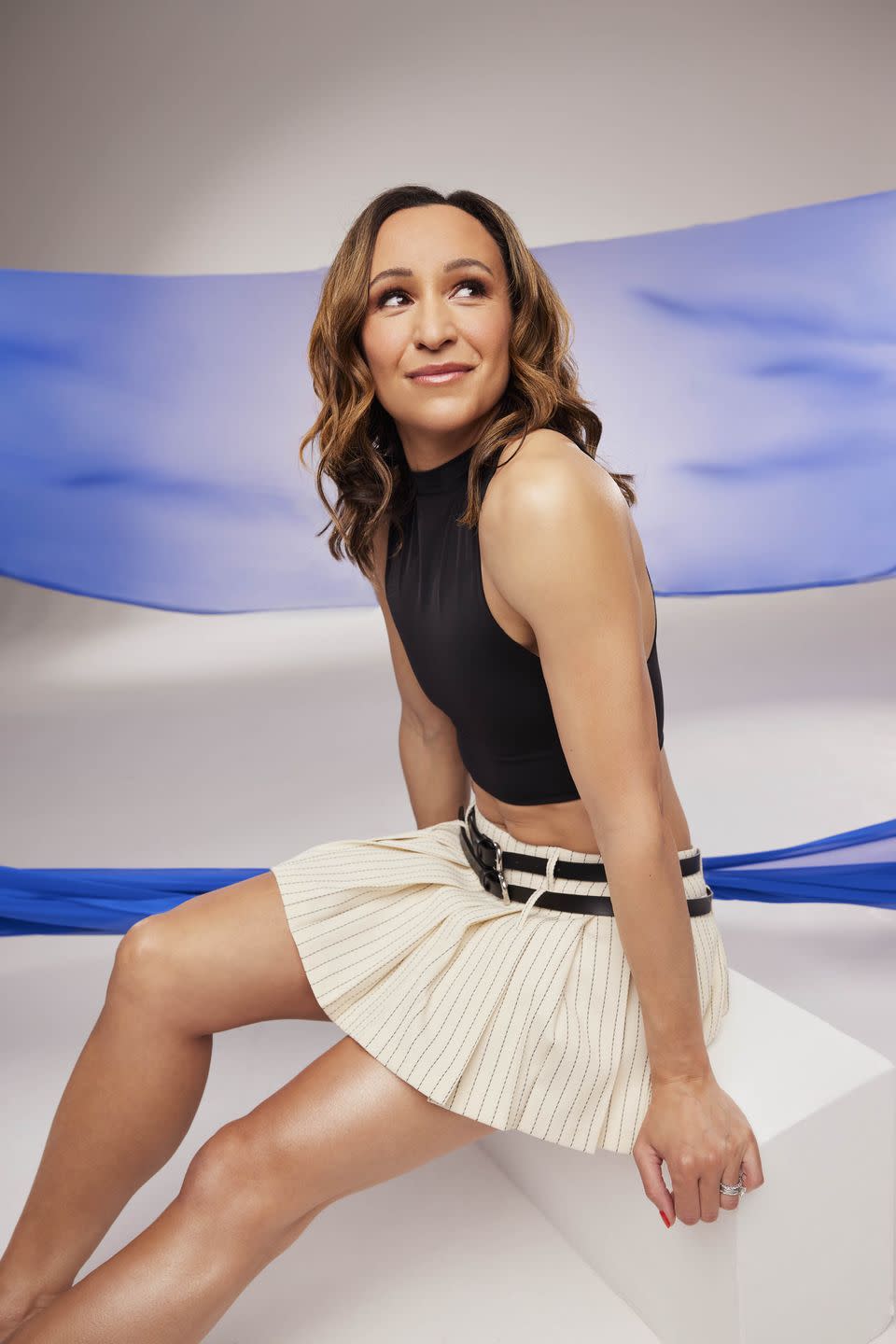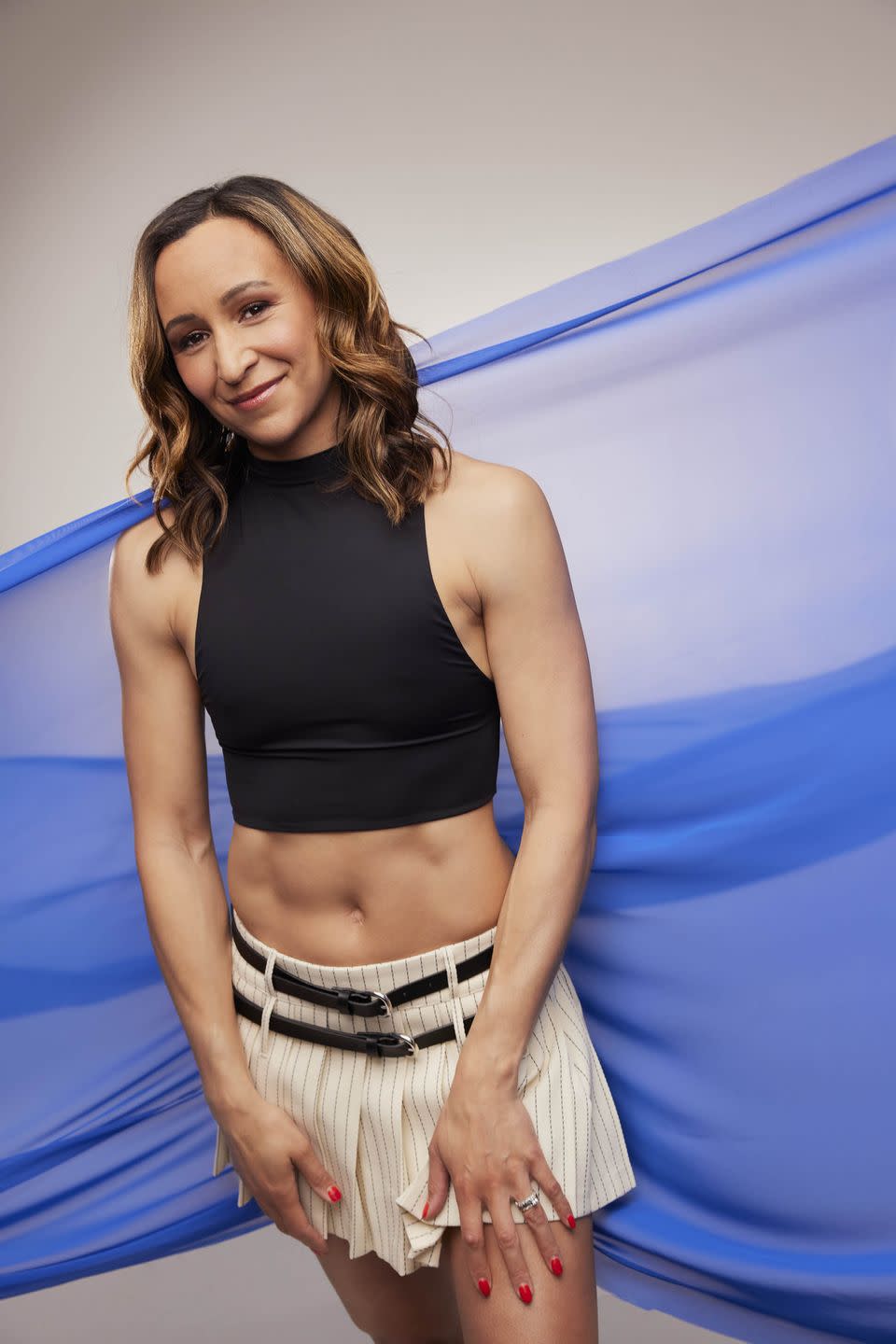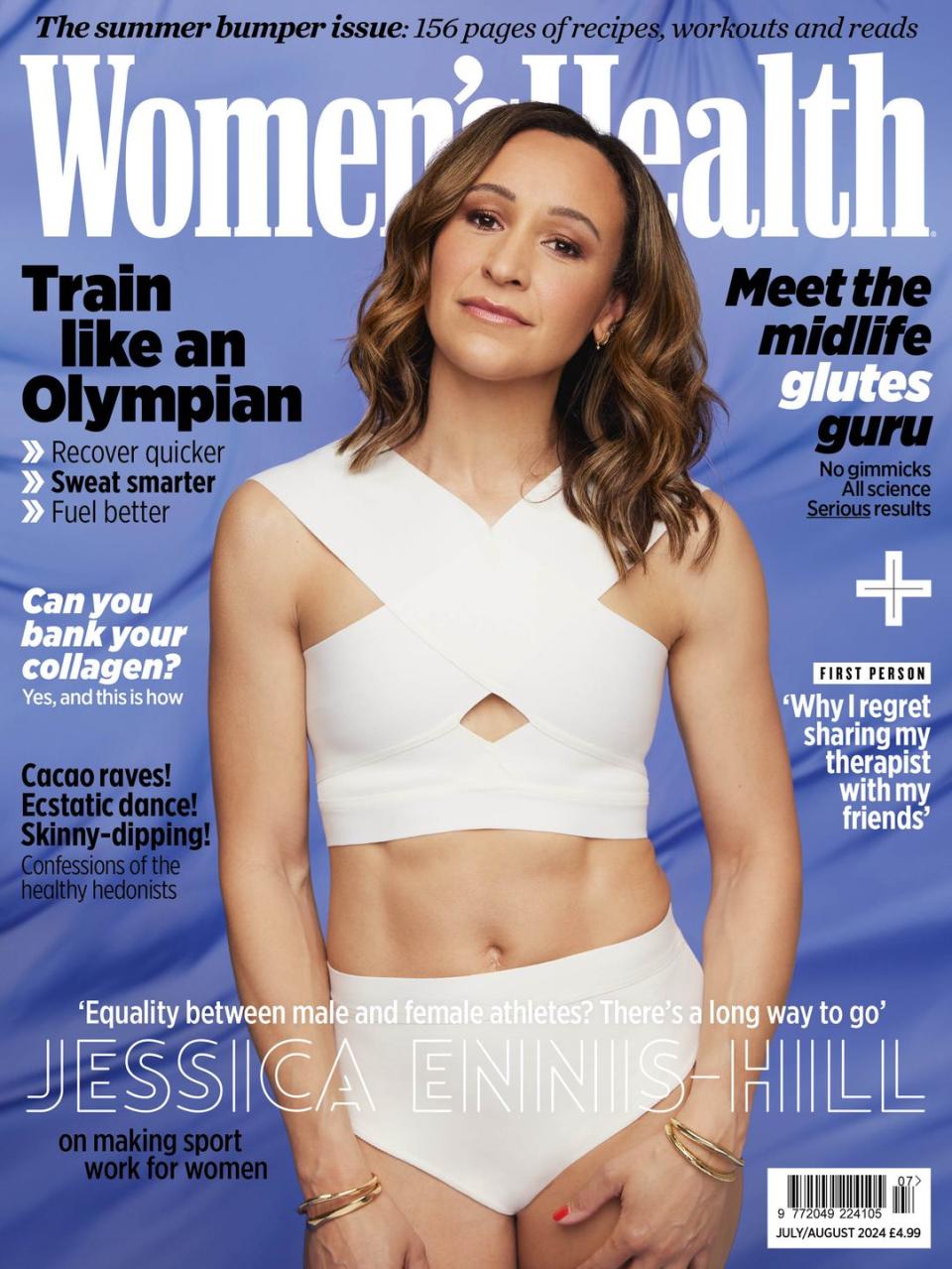Jessica Ennis-Hill: ‘Equality between the sexes in sport? There’s a long way to go’

If you’re after some insight into Jessica Ennis-Hill’s level of excitement about Paris, when I ask for her one to watch, she gives me four (British middle-distance runner Keely Hodgkinson, Dutch hurdler Femke Bol, Swedish pole vaulter Mondo Duplantis and the number-one British hopeful in the heptathlon, Katarina Johnson-Thompson).
If Tokyo was anything to go by, there’ll be quite the buzz vibrating within the BBC Sport box, where she’ll be telling the story of the games. ‘I still felt all the adrenaline,’ she smiles as she recalls her first non-competitive Games. ‘You know what it feels like to be on the track and to be lining up for the hurdles for your first event. You know how much it means.’
She recalls the metaphorical hurdles, too. After a storming performance at Rio 2016, Jess walked away from competitive life with a silver medal around her neck to catch the first flight home to the heart-swelling chaos of parenting her then-two-year-old son, Reggie.
‘As an athlete, you’re always in that mindset of: you don’t give up, you’ve got to keep going and pleasing… I didn’t want to let people down,’ she says, of making the decision to retire – not because she needed to, but because she wanted to. ‘I think more than anything, I probably have had great perspective. At times, just understanding that actually, this is great while it’s happening; I’m performing at my best; at the top of the world; brilliant. But also that this isn’t going to last forever... I just never want to have that feeling of pushing, pushing, pushing.’
Before long, Jess was turning the post-retirement career pivot into an art form. With the 2019 launch of Jennis – her eponymous fitness app – she segued seamlessly into femtech. Features help users ‘map’ their workouts according to their cycles and adapt their training to minimise perimenopause symptoms.

But forget learning the ropes of a new industry, it was the gender data gap that left Jess baffled. ‘Honestly, it’s so bizarre; until you actually start delving into it, you can’t believe it’s happened,’ she says. ‘The lack of studies and research – and it’s all done on men – it just seems so archaic.’
Indeed, just 6% of sport and exercise studies have focused exclusively on female participants. The consequences extend beyond the lab. ‘There are so many examples of women not being understood or being ignored. And that’s through a lack of research… and a lack of funding.’
Her next mission? To bring some clarity to the ‘grey area’: that intersection between elite sport and female health. ‘I don’t think anyone’s really doing it fully, like really helping female athletes to understand their bodies, through various transitional phases and giving them the layer of education that not only helps them during that career, but also post-retirement.’
We talk about recent progress on this front, most vocally from the current cohort of athletic talent; former WH cover star Dina Asher-Smith called for more research into the impact of periods on performance after crippling cramps forced her to pull out of the 2019 World Championships, while England’s Lionesses discussed training around their cycles following their Euros victory in 2022.
‘The conversations are being had,’ she agrees. ‘And I definitely see more athletes talking about it more openly in media interviews, which I think is great. But then it’s like, well, what are the tangible things that have been done within sport? And how is it actually changing?’
The female health topic on everyone’s lips in the run-up to Paris has been RED-S – or relative energy deficiency in sport. Coined in 2014 by the International Olympic Committee, it refers to the physiological response to inadequately fuelling a body to carry out the physical demands placed on it. Like a smartphone running 20 apps on a 10% battery, the body goes into energy-saving mode, pausing certain functions – having a period included.
Studies have linked RED-S with everything from low immunity and poor bone density to infertility, and its endemic nature in sport is such that a recent survey found 36% of athletes have ignored their missed periods, believing it to be normal – even advantageous – for an active person.

Jess hasn’t experienced RED-S herself, but she knows athletes who have. ‘I think, again, it’s a lack of education – because a lot of athletes don’t realise that they’re going through something like that until it’s gone so far down the line, as athletes are obviously always putting [their] bodies under stress.’
The remedy, as she sees it? More understanding of – and appreciation for – the mechanics of female biology. ‘It’s still quite a male-dominated area [in] a lot of sports with coaches and practitioners. And it can also be an uncomfortable environment to have that conversation. I think a lot of athletes feel like it’s a weakness as well to say, “Oh, actually, my period has changed,” or, “My energy levels are up and down.”’
If retirement confronted Jess with science’s suboptimal literacy about female bodies, it was pregnancy that made her realise how inadequately elite sport catered for athletes who become mothers. Jess recalls entering the life stage with her blinkers on. ‘I probably naively went into it all thinking that, actually, I’ll have a little break, have my son, then just carry on training; get into it all and it will just fit hand in hand,’ she recalls. ‘[But] as soon as you have your first child, you change completely. I wasn’t the same person. I was still very driven and I still wanted to finish my career. But I didn’t want to do it at the expense of not seeing my son and having quality time with him.’
In 2021, UK Sport issued pregnancy guidance for athletes and governing bodies. But 10 years ago, Jess’s sport was as clueless as she was.
‘Nothing came from the top. No one came to me and said, “Well, this is, like, the package,” [or] “Here’s how we’re going to support you,”’ she recalls. ‘It’s still a bit of a grey area where you just have to find your own way through.’ For Jess, that looked like training in short, sharp bursts – doing as much conditioning as possible in her garage – and 15 months after giving birth, she bagged the World Championship gold in Beijing.
Her postnatal comeback didn’t go unnoticed. ‘When Laura [Kenny] got pregnant, we chatted and she asked how I did it and some of the learnings… But she was doing that off her own back and, you know, seeking me out.’

Did Jess ever feel jealous of her male counterparts and their relative lack of physical sacrifice? ‘Not necessarily,’ she muses. ‘But I do think that, as a woman, you feel judged in a different way than a man having his first child and coming back to sport.’
How does that manifest? ‘Someone who works at the track, I remember [them] just looking at me thinking, “What are you doing” and “You shouldn’t be running”… I think, as a female athlete, when you come back, there are a lot of questions. Whereas a male athlete coming back after having his first child? [It’s like], let’s just crack on.’ Given this context, does Jess think true equality between the sexes is possible in sport? ‘Yeah, I think it’s changing,’ she says, before adding, ‘We still have a long way to go on that road.’
If progress is a journey, Jess is an enthusiastic passenger. Perhaps unsurprisingly for someone whose second act has been shaped by the sharing of knowledge, community looms large in her ambitions for the next phase of change.
‘It would be great if…federations could bring more athletes – female athletes – together to share experiences and learn from them and just create a smoother pathway and transition through these stages.’
But I’m curious to know what else is driving Jess now she no longer has the carrot of competition. ‘I think I always want to be a best version of myself, whether that’s within sport, or being the best mum I can be or whatever it is. I just want to fulfil my best. I think that’s definitely a driving force... It’s so, so simple, but I’m massively motivated by just being happy and having perspective in life,’ she shares, before adding, fittingly – ‘and nothing being too out of sync.’
More Olympics content...
How Shauna Coxsey built friends and followers on the climbing wall
This is what the athletes at the Paris Olympics will be eating
Adidas reveals the official Team GB kit for the 2024 Olympics and Paralympics
Cut through the noise and get practical, expert advice, home workouts, easy nutrition and more direct to your inbox. Sign up to the WOMEN'S HEALTH NEWSLETTER
You Might Also Like


